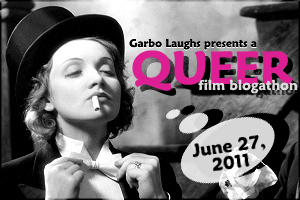There's an old Harlan Ellison story called "Hitler Painted Roses" that postulates a woman who burns in hell for a murder she didn't commit. In his notes on the story, Ellison suggests that the idea was inspired by Lizzy Borden, who everyone knows "gave her mother forty whacks," and all that. The only problem with this is that Lizzy Borden didn't do it. She was knocked out on laudanum at the time. She was acquitted after the jury deliberated for a mere forty minutes. Facts don't really matter here, though, because what everybody knows about Lizzy Borden comes from a children's rhyme that went viral. Surely, Ellison surmised, Lizzy Borden burns in hell to this very day and never mind that she was innocent.
Several of the films at True/False this year address public perception of real-life criminals, taking what "everybody knows," and turning it inside out. Human beings are messy creatures, after all, neither angel or devil but some mixture of the two. Unfortunately, we are all profound mysteries to each other, a fact that these movies confront head on.
Captivated: The Trials of Pamela Smart (2014, directed by Jeremiah Zagar) takes on the tricky relationship between media and the criminal justice system, casting enough shade on both of them that, a quarter century further on, perhaps an objective look at the events of the case can finally be seen. Certainly, the media frenzy tainted every part of the process with this case, and in the years since, there have been books and movies about it. But was justice done? That's a question that still needs answering. Unfortunately, the whole thing is still viewed through a fog of media, a fact the film emphasizes with its opening and closing shots set in a theater, where the curtain opens and closes on a television. It's a really big show, as Ed Sullivan might once have said.
The facts as the cultural massmind knows them are these: Young, pretty schoolteacher Pamela Smart had an affair with a fifteen year-old student and conspired with her lover and three other boys to murder her husband. The trial was the first to allow television cameras in the courtroom, creating a media frenzy the likes of which the justice system had never seen before. The Smart trial became an ancestor to reality TV. But did the media coverage taint the jury selection? One juror, who recorded her thoughts as the trial progressed, thought so. The judge famously quipped that he hoped that Clint Eastwood would play him in the movie. Further, there were irregularities in the way evidence was admitted an in the way witnesses were handled. The three boys who committed the crime were held in the same facility, enabling them to create a story they could corroborate without inconsistencies. Certain witnesses were excluded. The wire tap that incriminated Smart was compromised. Smart, of course, was convicted, and her crime carried a mandatory life sentence without possibility of parole. The boys who actually killed her husband each got 25 years. They're getting out soon, as it so happens.
This film is only tangentially about Pamela Smart, even though she's at the center of the film. The smart we see in prison and in the interviews the filmmakers conducted with her is very different from the media-addicted barbie of the popular imagination. That image was constructed by the media, and the film talks with the architects of that image, too. Arguably, the movie is "about" them. Among them are film director Joyce Chopra, who made a television movie out of the story starring Helen Hunt; Joyce Maynard, author of To Die For (made into the Gus Van Sant book of the same title); and Bill Spencer, the reporter who covered the story from the outset. Each of them wonders about what really happened. The actual event is a bit like quantum physics: the act of observing it changed the conditions of the event.
Perhaps the film's biggest coup is being the first to interview the recently released Raymond Fowler, who drove the car that carried his three friends to the scene of the crime. There's an expectation suggested by the film that Fowler will exonerate Smart. Instead, he just muddies the water. His memories, the film elides, have been polluted by the movies, too.
For all that, I wish this were better. This is a slick, state of the art documentary that relies a bit too heavily on intimate interviews and archive footage, though I suppose this is by necessity. It tends to render this more as journalism than cinema. More troubling: it makes its points early, leaving itself only the question of Smart's innocence or guilt to fall back on toward the end of the film. This is a losing game, because that question is ultimately unanswerable. The justice system may have been corrupted by the media, but that doesn't mean it failed. Smart admits to having an affair with William Flynn--itself a criminal act with steep punishments--so is the justice of her punishment one of degrees? Is she a murderer? Lizzy Borden will certainly commiserate with Pamela Smart in some alternate reality where they can meet.
Happy Valley (2014, directed by Amir Bar-Lev) takes on a more recent scandal: the pedophilia conviction of Penn State football coach Jerry Sandusky and it's collateral damage to Penn State itself, its football program, and beloved head coach Joe Paterno. It's a film in which the central actor's actions are not in doubt. Sandusky molested at least 26 boys over the course of his career at Penn State. Rather, it's about the responsibility of the community itself and it's about putting too much faith in father figures and, indeed, of in institutions that maybe don't deserve them. At the very least, it paints such figures as flawed, complex human beings.
The unfolding of the scandal is mostly rendered in archival footage and interviews with surviving principles (Sandusky himself appears only in archival footage and the filmmakers are wise to give him no voice in this film). But unlike the filmmakers of Captivated, they open the frame and walk about State College to take in the sights. One of those sights is the controversial statue of Joe Paterno, which acts as a polarizing talisman for the community. In the film's most memorable scene, a man stands next to the statue holding a sign indicting Paterno for his "crimes." Paterno reported Sandusky's peccadilloes only to his superiors at the University, who promptly did nothing with the information. Is this a crime of omission? Of negligence? Paterno was famous in his community and nationwide for the cleanliness of his program, one that had the highest graduation rate of any college football program in the country. He was a philanthropist, too. Is all this washed away? And what of his fans, the ones who rioted when Paterno was fired? Are they seeing only the saint and not the man? Is this an example of the exceptionalism reserved for sports figures in colleges and in the USA generally? The film doesn't take a stand, though its interviewees do. One particular freshman, ensconced in a dorm room that's a temple to Penn State football, feels that the culpability is Sandusky's alone, and that his community is being tarred with the crime as if everyone was culpable. Sandusky's adopted son--himself one of his father's victims--feels ostracized in his community. These are complex issues.
When, at the end, the Penn State community is shown embracing a new administration and a new football program as if they were having their religion revived, there's a real sense of erasure, of a culture willing to forget. Again, the statue of Paterno is a talisman, significant by its absence. Paterno's biographer notices how completely it has been erased. That fervent freshman senses it, too, and his disillusion is elided by shots of him vacating his dorm room, taking down his paraphernalia, and wandering into the future. Paterno's family commission an alternative to the Freeh Report, the document that damns Paterno and Penn State football, but to no avail. Their time is done, their dynasty ended. Has anything changed? Has the culture changed? Who knows?
True/False Film Fest 2014- Thursday from True/False Film Fest on Vimeo.

I'm trying out Patreon as a means of funding my blogs. They don't have a widget yet, so this link will just have to do. If you like my writing and art and if you'd like to support Krell Laboratories, please come on over and pledge. Thanks.


















No comments:
Post a Comment